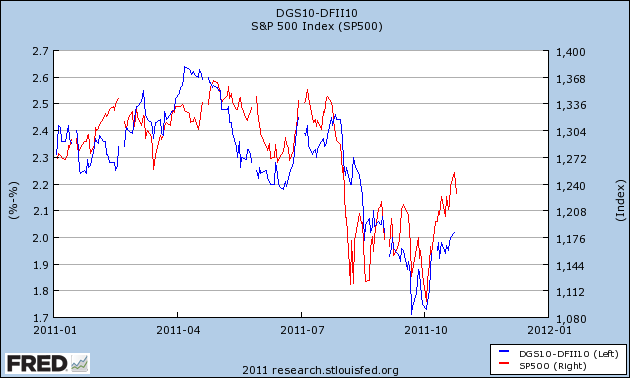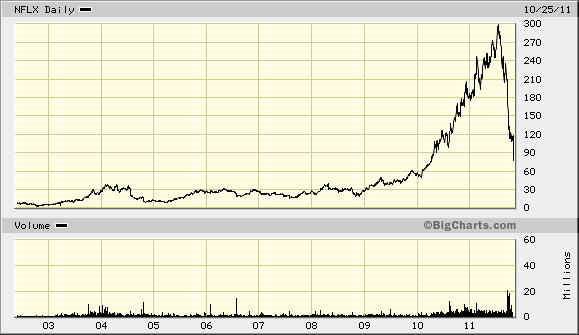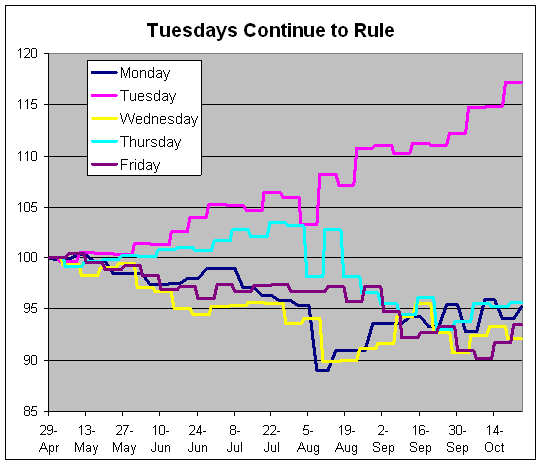Author Archive
-
I Don’t Care What Anyone Says, This Graph Still Freaks Me Out
Eddy Elfenbein, October 26th, 2011 at 2:57 pmThe S&P 500 alongside the 10-year TIPs spread:
Stocks continue to like inflation expectations.
-
IBM’s Misguided Share Repurchase
Eddy Elfenbein, October 26th, 2011 at 1:54 pmI think these things are specifically done to annoy me.
IBM ($IBM) has been doing very well lately. The stock recently made an all-time high. The company just reported earnings that beat expectations by six cents per share. They also announced another 75-cent dividend.
Technology company International Business Machines Corp. said Tuesday that its board authorized an additional $7 billion for the company’s stock repurchase program.
That’s on top of about $5.2 billion remaining in a prior buyback program at the end of September.
IBM plans to ask its board for additional repurchase authorization at a board meeting in April.
I loathe share buybacks and this is an excellent example of why. IBM’s program comes to $12.2 billion which is more than $10 per share. Of course, that’s just what’s announced. We don’t know what will be implemented.
My view is simple: just give that money to shareholders! It’s theirs!
I think most shareholders would much rather have $10 in hand than have the hope that company purchases will push the shares up by $10. Plus, shareholders are watching their money buy a stock that’s already near an all-time high.
Just give them the money as a dividend and if they want to buy more stock, they can. The current dividend comes to $3 per year which is only 22% of this year’s estimated earnings.
A better idea would be for the board to ditch the buybacks and chose a target, say 30% of full-year earnings to pay out as dividends. For next year that would be a dividend of $1.10 per share.
I should add that I’d like to see the U.S. tax laws changed so it doesn’t make a difference how shareholders get their own money.
-
Q3 Earnings Update
Eddy Elfenbein, October 26th, 2011 at 12:41 pmHere are the latest numbers from S&P (which are slightly different from Bloomberg’s, don’t ask me why).
For the S&P 500; 214 companies have reported so far, 145 beat estimates, 45 missed and 24 were inline.
Earnings are tracking at $24.91 which is a 15.5% increase over last year. It’s also a 0.2% increase over the $24.86 from Q2.
The estimate for Q4 is $25.15 which translates to $97.48 for all of 2011. Since most of the data is in, we can assume that’s pretty accurate.
Going further out, that’s hard to say. The current estimate is $108.75 for 2012 which I think is too high.
Here’s an odd fact: The earnings for third-quarter are on track to be more than 75% higher than those of the third quarter in 2000. Yet the S&P 500 is down 10% from 11 years ago today. As I said, multiple contraction ain’t much fun.
-
Ford’s Earnings: Good But Could Be Better
Eddy Elfenbein, October 26th, 2011 at 10:06 amFord Motor ($F) reported earnings this morning of 46 cents per share. That was two cents better than Wall Street’s consensus. This is their tenth-straight quarter of profitability.
Fundamentally this was a solid report, but there were a few weak spots. Let’s go over some of the details. For the quarter, the company netted $1.65 billion which was slightly less than the $1.69 billion from last year’s third quarter. Last year’s per-share result was 48 cents.
Ford’s sales jumped to $33.1 billion which is a 14% increase over last year. That’s a really good number. Wall Street was expecting $30.5 billion. Their share of the U.S. market ticked up to 16.8%. The problem, however, is with profit margins. Due to the plunge in commodity prices, particularly for copper, Ford said that its margins may fall to 5.7%. For me, the key stat is that if you strip out Ford’s losses on copper hedging, their profits rose by 12%.
The odd thing about Ford’s business is that they borrowed a ton of money before the economy fell apart. The good news is that they had the cash to withstand the recession. The bad news is that they still have a ton of debt. The good part, again, is that they’ve been able to pay that down. Ford now has $12.7 billion of automotive debt.
Ford was also hurt by an operating loss in Europe of $306 million. The company also said that it’s not going to start paying a dividend just yet which is probably a smart move.
Overall, I like this report. The basics of Ford’s business are doing well. They were hurt by problems in Europe and by commodity prices, neither of which they can control. Now that the union deal is done and their credit has been upgraded, Ford has shown that it can deliver earnings.
The stock is down today which is probably due to the warnings of lower margins, but that’s not a long-term issue. Ford continues to be a very good buy.
Stay tuned for AFLAC ($AFL) after the close.
-
Morning News: October 26, 2011
Eddy Elfenbein, October 26th, 2011 at 5:41 amEU Banks Warn of Credit Drought Amid Push to Raise Capital
Italy Keeps Europe on Tenterhooks Over Reform
China Offers Case Against Rapid Yuan Rise
Yen Boosted as Smaller Volatility Lures Investors: Japan Credit
Wall St. Giants Seek a Piece of Nigeria’s Sovereign Fund
Crude Oil Settles Up 2.1% On Supply Concerns
Floods Ruining Thai Rice Erases Global Glut
Amazon Profit Plunges 73% As Costs Mount
Netflix’s Growth-Over-Profit Strategy Threatens Cash Levels
Amazon’s Apple War Costs Investors $20 Billion
3M Lowers Year Outlook on Slowing Global Growth
Olympus President, Chairman Kikukawa Resigns
Goldman Board’s Gupta to Face Criminal Charges
I.B.M. Names Virginia Rometty as New Chief Executive
Epicurean Dealmaker: You’re Doing It Wrong
Phil Pearlman: Might This Be a Massive Double Top In Bonds?
Howard Lindzon: Pin a Price on Netflix…No Different than 130…Time to Avoid.
Be sure to follow me on Twitter.
-
Income Tax Poll
Eddy Elfenbein, October 25th, 2011 at 10:48 pm
-
Netflix -37%
Eddy Elfenbein, October 25th, 2011 at 11:21 amHere’s an important lesson in investing.
We come at this with all these fancy tools and numbers to try and make sense of something that is, at root, almost purely chaotic.
As investors, we try desperately to rationalize something that’s as solid as the breeze.
You can be slowly wrong, wrong, wrong for a long time and then suddenly be right.
The words on a memorial to Sigmund Freud read, “The voice of reason is small, but very persistent.”
-
Ford May Bring Back Dividend
Eddy Elfenbein, October 25th, 2011 at 10:09 amFord Motor ($F) progressively cut its quarterly dividend from 30 cents per share to 10 cents to 5 cents, and it finally ditched it all together five years ago.
Thanks to the recent credit upgrades and union deal, the dividend may make a comeback. In my opinion the dividend isn’t why the stock is a good value, but it reflects the company’s remarkable turnaround.
My guess is that any dividend will start out pretty modest, perhaps eight or ten cents per share. Brian Johnson at Barclay’s Capital thinks it could be eight cents per share.
“Ford is doing all the right things and they sure haven’t gotten any credit for it from the Street,” said Gary Bradshaw, a fund manager at Hodges Capital Management in Dallas, who recently purchased 50,000 shares below $10 to increase his Ford holding to 250,000 shares. “That’s ridiculously cheap for a company whose outlook is improving.”
-
Third-Quarter Earnings Season Update
Eddy Elfenbein, October 25th, 2011 at 9:45 amBloomberg has all the numbers.
Of the 500 companies in the S&P 500, 147 have reported so far.
Of those, 103 or 70.1% have beaten estimates.
14 or 9.5% have been inline
30 or 20.4% have missed estimates
Earnings are tracking at $24.45 which is up 11.85% from last year’s third quarter.
-
The Tuesday Rally Lives
Eddy Elfenbein, October 25th, 2011 at 8:17 amSince the stock market topped on April 29th, the S&P 500 is down by 8.02%. Yet there’s been an odd exception to the market’s downward trend: the market has done very well, on average, on Tuesdays.
Since April 29th, the market has been open on 25 Tuesdays. Combined, the S&P 500 is up 17.16% on those days. No other day comes close.
My guess is that it’s because the recent sell-off has largely been political in nature which explains why the important news has come over the weekend. In response, Mondays have been down while Tuesdays have been weighted with relief rallies.



 Eddy Elfenbein is a Washington, DC-based speaker, portfolio manager and editor of the blog Crossing Wall Street. His
Eddy Elfenbein is a Washington, DC-based speaker, portfolio manager and editor of the blog Crossing Wall Street. His